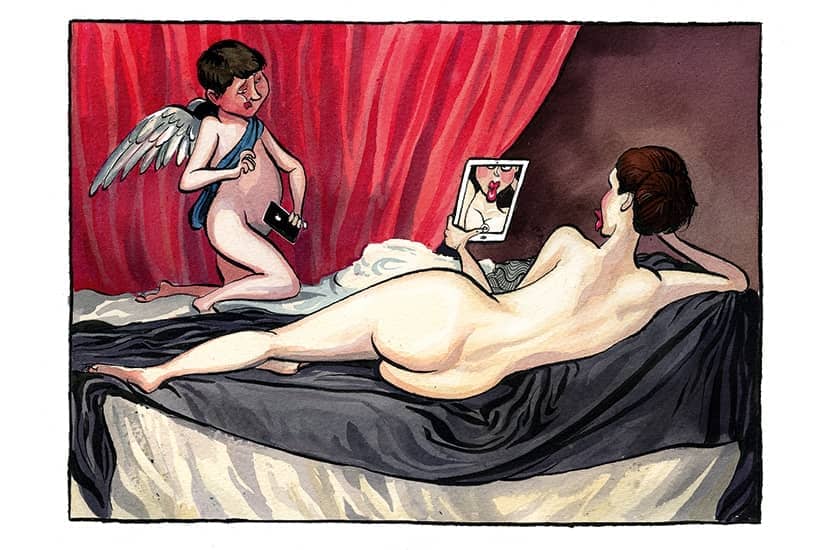In 2013 the Oxford English Dictionary named ‘selfie’ as the word of the year. Its use had increased by 17,000 per cent in just 12 months, the OED revealed. Before long a cottage industry of feminist scholars sprang up, dedicated to producing gruesome waffle on the subject.
A paper by Emma Renold of Cardiff University and Jessica Ringrose of University College London, for example, was entitled ‘Selfies, relfies and phallic tagging: post-human participations [sic] in teen digital sexuality assemblages’. Not to be outdone, Katie Warfield of Kwantlen Polytechnic University in Canada, wrote ‘MirrorCamera-Room: the gendered multi-(in)stabilities of the selfie’. Dr Terri Senft of New York University founded an international Selfie Researchers Network to study ‘the politics and aesthetics of selfie culture’. It was all very exciting. ‘As an academic known for publishing on selfie culture,’ wrote Senft, ‘I often find myself dialoguing with reporters charged with answering for their readers once and for all whether taking and circulating photos of oneself constitutes an empowering act, or a disempowering one’.
When feminist academics start writing such gobbledegook about a social trend, it’s never long before the real world moves on. In 2018 Wired magazine declared that ‘the selfie as we know it is dead’ — adding that ‘Data from Google Trends has also shown a steady decline in the keyword since it was added to the dictionary in 2013.’

A decade ago, teenagers were addicted to photographing themselves. Today’s Generation Z adolescents can’t be bothered with Instagram, which they regard as an antiquated toy for millennials. And, as far as I can see, the Selfie Researchers Network hasn’t updated its website for seven years.
Today teenagers make TikTok videos in which they perform 30-second comedy sketches and dance routines, or pose as models. The Chinese app has one billion users worldwide, including 70 per cent of all American teenagers. What’s disconcerting is how artfully professional these young people are. This is partly thanks to the cunning format. But it’s also because, in western society generally, the urge to mimic celebrities has been growing stronger for decades.
In her 1998 book The Overspent American, Juliet Schor argued that people in suburban neighbourhoods had stopped trying to keep up with the Joneses next door, whom they probably didn’t even know, and instead based their aspirations on a ‘reference group’ of celebrities and other public figures. She was worried that maxing out credit cards on a fake lifestyle would lead to financial and psychological despair, and it often did.
But then, with disorientating speed, digital technology lowered the cost of imitating the rich and famous. The combination of mobile-phone cameras and social media created the selfie: not just a photograph of yourself but also a glimpse of your inner narcissist.
We meet famous people all the time now. There are more of them. Gone are the days when you could dine out on having shaken hands with Max Bygraves at your daughter’s school fête. (My grandmother had that honour and didn’t let us forget it.) We may not think of ourselves as celebrities, but we don’t freeze in front of a television camera, as people did as recently as the 1970s when, say, ambushed for a vox pop by a cub reporter from Anglia Television. ‘What do you make of these punk rockers, then?’ Cue clearing of throat, patting down of hair and terror in the eyes.
When feminist academics start writing such gobbledegook, it’s never long before the real world moves on
Seen in this light, the selfie craze can be interpreted as a stage on the journey towards universal self-obsession. It wouldn’t have surprised the late American historian Christopher Lasch. His book The Culture of Narcissism, published in 1979, described a society in which both political utopianism and ‘hierarchies of work and power’ had wilted. This created feelings of isolation and a craving for validation. Everywhere he looked he saw narcissists who ‘cannot live without an admiring audience’.
Lasch died in 1994 — about seven years before social media made it difficult for anyone to live without an audience, whether they wanted one or not. And it wasn’t necessarily an admiring audience.
If people didn’t ‘like’ your Instagram selfies, did that mean they didn’t like you? Psychologists reported a sharp increase in users traumatised by their use of the app. Some plastic surgeons made a fortune out of the distorting lens of phone cameras, which made noses seem bigger. Millennials worked out that while selfies were a neat way of preserving happy memories, they were also a cruel record of the ageing process. They got sick of scrolling down their timelines and seeing their waistlines shrink and wrinkles disappear. And so the selfie craze petered out.
How will today’s one billion juvenile luvvies cope when they are no longer ‘TikTok famous’, as they put it? Perhaps they’ll be insufferable when they finally enter the workplace. Then again — and this is a scary thought — perhaps they’ll need their comic timing, meticulous grooming and manufactured charisma in order to survive.
We’re already moving in that direction. The office workers of 50 years ago would have been bewildered by the way 21st-century employees treat the most routine meetings as talent contests. They have no choice: the hierarchical safety net that was already full of holes when Lasch wrote his book has been whisked away. Middle-aged people, unintentionally aping their all-singing, all-dancing children, are frantically trying to create a little charismatic buzz in the room — not out of vanity, necessarily, but because they’ll lose their jobs if they’re old and boring. Their painted-on smiles betray a deep anxiety. And if you doubt that, just look at their selfies.







Comments